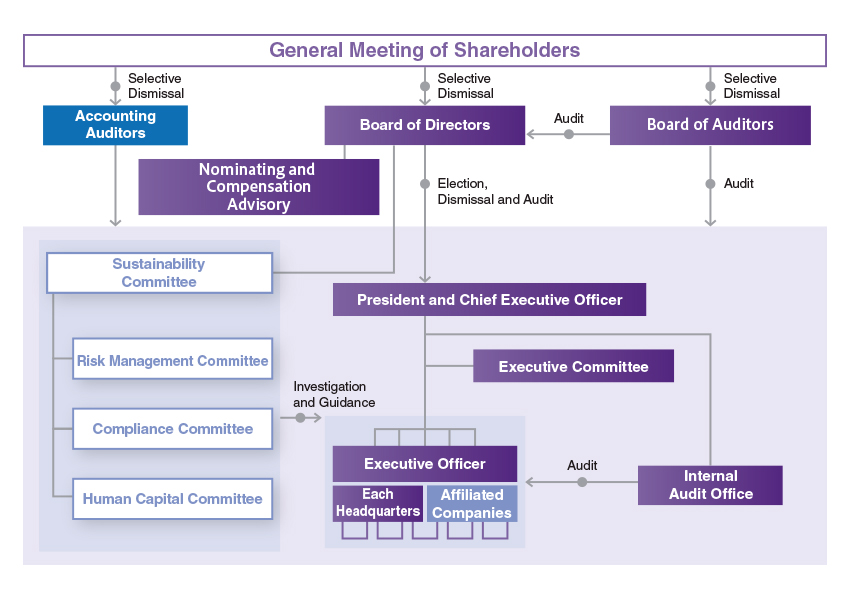Corporate Governance
Our management philosophy is “to contribute to healthcare through the development and sale of superior, state-of-the-art medical devices,” and we aim to strengthen corporate governance in order to fulfill our social mission and responsibility by developing businesses related to healthcare, as well as to maintain and improve relationships of trust with shareholders and other stakeholders, in order to achieve sustainable growth of the company and increase corporate value over the medium to long term.
1. Basic Approach to Corporate Governance
From the viewpoint of the Group’s sustainable growth and medium- to long-term enhancement of corporate value, we believe that the essence of corporate governance is to ensure the transparency and fairness of our decision-making and to increase the vitality of management by making effective use of management resources and making prompt and decisive decisions.
- Respect the rights of shareholders and ensure equality.
- Consider the interests of stakeholders, including shareholders, and work with them appropriately.
- We will appropriately disclose corporate information and ensure transparency.
- The Board of Directors shall supervise the execution of business operations effectively from an independent and objective standpoint.
- Engage in constructive dialogue with shareholders to a reasonable extent.
1. Supervision
(1)Board of Directors
The Board of Directors deliberates and decides important management matters, such as management strategies and plans, in order to achieve sustainable growth and medium- to long-term improvement in corporate value, based on its fiduciary responsibility and accountability to shareholders. The Board of Directors also supervises the overall management of the Group by reporting on the status of business execution by executive officers, important business execution by affiliated companies, compliance and risk management of the Company and its affiliated companies, and promotion of sustainability.
The Board of Directors also establishes the overall balance of knowledge, experience, opinions, competence, diversity, and size of the Board of Directors, and ensures that the Board is comprised of members who, in the Company’s judgment, best represent the knowledge, experience, and competence of the Company’s directors, regardless of gender, race, or nationality, with due regard to the overall balance of the Board in light of the business environment. In addition, we have appointed a number of independent non-executive directors to appropriately reflect in our management policy the opinions of persons with a wealth of experience and insight, such as corporate executives and legal professionals from outside the company.
(2)Nomination and Compensation Advisory Committee
The Company has established the Nomination and Compensation Advisory Committee as an advisory committee to the Board of Directors. The majority of the members of the Nomination and Compensation Advisory Committee are independent non-executive directors, and the chairman of the committee is an independent non-executive director.
Role of the Nominating and Compensation Advisory Committee
- ① Report to the Board of Directors on the election of candidates for directors and executive officers and the dismissal of directors and executive officers, and the election of candidates for corporate auditors and the dismissal of corporate auditors.
- ② The Company shall review and report to the Board of Directors on the policy regarding remuneration, etc. for Directors and Executive Officers and the details of remuneration, etc. for each individual Director and Executive Officer.
- ③ Appropriately evaluate the Company’s performance, etc., and report to the Board of Directors to reflect such evaluation in the remuneration of each director and executive officer.
(3)Sustainability Committee
The Sustainability Committee shall deliberate on the Group’s cross-cutting policies, strategies, and plans for the promotion of sustainability. We also recognize that addressing the sustainability issues presented by the SDGs and other issues is a materiality that will not only reduce our business continuity risk, but also lead to profit opportunities. We aim to fulfill our corporate social responsibility (CSR).
(4)Risk Management Committee
We have established a Risk Management Committee to formulate risk management policies and plans for the various risks surrounding our group’s business, with the aim of spreading awareness of risk management and early detection of risks.
(5)Compliance Committee
We have established a Compliance Committee to formulate policies and plans for compliance with laws, regulations, and rules with the aim of fostering a compliance-oriented corporate culture.
(6)Human Capital Committee
We have established a Human Capital Committee to promote activities related to human capital management under our “Basic Policy on Sustainability Initiatives.
2.Business Execution
(1)Executive Board
The Board of Executive Officers is established as a body to deliberate and pass resolutions on matters that require prior deliberation among matters to be brought before the Board of Directors, and on important matters concerning the execution of business operations.
3.Auditing
(1)Board of Corporate Auditors
The Board of Corporate Auditors, as an independent body entrusted by shareholders, audits the execution of duties by directors, the company’s internal controls, business performance, and financial condition. Specifically, full-time corporate auditors attend not only meetings of the Board of Directors, but also meetings of the Executive Committee, the Management Committee, and other important internal meetings. In addition, corporate auditors regularly exchange opinions with the president, executive officers, and others, and receive monthly circulars of approval documents and minutes of executive officers’ meetings and management meetings to confirm their contents. The Board of Corporate Auditors also ensures transparency and fairness in accounting audits by fulfilling its roles and responsibilities, including the selection and dismissal of external accounting auditors and the exercise of its authority regarding audit fees.
(2)Internal Audit Office
The Internal Audit Office audits the accounting and operations of the Group, including affiliated companies, and reports the results to the Board of Directors. In addition, audits are conducted in cooperation with corporate auditors, accounting auditors, and the Internal Audit Office.
(3)Accounting Auditor
The Company’s accounting auditor is Taiyo LLC,.


